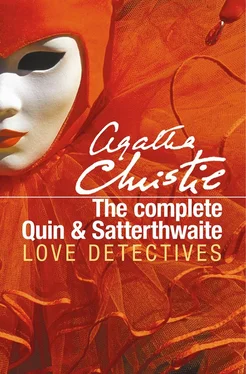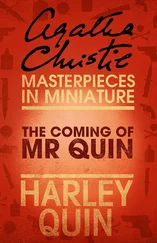Mr Satterthwaite thought to himself: ‘It’s worse for him than it would be for me. Imagination, conjecture, speculation – they can do a lot for you. You can, as it were, ring the changes upon pain. The uncomprehending blind suffering of an animal – that’s terrible …’
Cosden spoke suddenly in a harsh voice.
‘I’m going for a stroll after dinner. You – you understand? The third time’s lucky. For God’s sake don’t interfere. I know your interference will be well-meaning and all that – but take it from me, it’s useless.’
Mr Satterthwaite drew himself up.
‘I never interfere,’ he said, thereby giving the lie to the whole purpose and object of his existence.
‘I know what you think –’ went on Cosden, but he was interrupted.
‘You must excuse me, but there I beg to differ from you,’ said Mr Satterthwaite. ‘Nobody knows what another person is thinking. They may imagine they do, but they are nearly always wrong.’
‘Well, perhaps that’s so.’ Cosden was doubtful, slightly taken aback.
‘Thought is yours only,’ said his companion. ‘Nobody can alter or influence the use you mean to make of it. Let us talk of a less painful subject. That old villa, for instance. It has a curious charm, withdrawn, sheltered from the world, shielding heaven knows what mystery. It tempted me to do a doubtful action. I tried one of the shutters.’
‘You did?’ Cosden turned his head sharply. ‘But it was fastened, of course?’
‘No,’ said Mr Satterthwaite. ‘It was open.’ He added gently: ‘The third shutter from the end.’
‘Why,’ Cosden burst out, ‘that was the one –’
He broke off suddenly, but Mr Satterthwaite had seen the light that had sprung up in his eyes. He rose – satisfied.
Some slight tinge of anxiety still remained with him. Using his favourite metaphor of a drama, he hoped that he had spoken his few lines correctly. For they were very important lines.
But thinking it over, his artistic judgment was satisfied. On his way up to the cliff, Cosden would try that shutter. It was not in human nature to resist. A memory of twenty odd years ago had brought him to this spot, the same memory would take him to the shutter. And afterwards?
‘I shall know in the morning,’ said Mr Satterthwaite, and proceeded to change methodically for his evening meal.
It was somewhere round ten o’clock that Mr Satterthwaite set foot once more in the garden of La Paz. Manuel bade him a smiling ‘Good morning,’ and handed him a single rosebud which Mr Satterthwaite put carefully into his buttonhole. Then he went on to the house. He stood there for some minutes looking up at the peaceful white walls, the trailing orange creeper, and the faded green shutters. So silent, so peaceful. Had the whole thing been a dream?
But at that moment one of the windows opened and the lady who occupied Mr Satterthwaite’s thoughts came out. She came straight to him with a buoyant swaying walk, like someone carried on a great wave of exultation. Her eyes were shining, her colour high. She looked like a figure of joy on a frieze. There was no hesitation about her, no doubts or tremors. Straight to Mr Satterthwaite she came, put her hands on his shoulders and kissed him – not once but many times. Large, dark, red roses, very velvety – that is how he thought of it afterwards. Sunshine, summer, birds singing – that was the atmosphere into which he felt himself caught up. Warmth, joy and tremendous vigour.
‘I’m so happy,’ she said. ‘You darling! How did you know? How could you know? You’re like the good magician in the fairy tales.’
She paused, a sort of breathlessness of happiness upon her.
‘We’re going over today – to the Consul – to get married. When John comes, his father will be there. We’ll tell him there was some misunderstanding in the past. Oh! he won’t ask questions. Oh! I’m so happy – so happy – so happy.’
Happiness did indeed surge from her like a tide. It lapped round Mr Satterthwaite in a warm exhilarating flood.
‘It’s so wonderful to Anthony to find he has a son. I never dreamt he’d mind or care.’ She looked confidently into Mr Satterthwaite’s eyes. ‘Isn’t it strange how things come right and end all beautifully?’
He had his clearest vision of her yet. A child – still a child – with her love of make believe – her fairy tales that ended beautifully with two people ‘living happily ever afterwards’.
He said gently:
‘If you bring this man of yours happiness in these last months, you will indeed have done a very beautiful thing.’
Her eyes opened wide – surprised.
‘Oh!’ she said. ‘You don’t think I’d let him die, do you? After all these years – when he’s come to me. I’ve known lots of people whom doctors have given up and who are alive today. Die? Of course he’s not going to die!’
He looked at her – her strength, her beauty, her vitality – her indomitable courage and will. He, too, had known doctors to be mistaken … The personal factor – you never knew how much and how little it counted.
She said again, with scorn and amusement in her voice:
‘You don’t think I’d let him die, do you?’
‘No,’ said Mr Satterthwaite at last very gently. ‘Somehow, my dear, I don’t think you will …’
Then at last he walked down the cypress path to the bench overlooking the sea and found there the person he was expecting to see. Mr Quin rose and greeted him – the same as ever, dark, saturnine, smiling and sad.
‘You expected me?’ he asked.
And Mr Satterthwaite answered: ‘Yes, I expected you.’
They sat together on the bench.
‘I have an idea that you have been playing Providence once more, to judge by your expression,’ said Mr Quin presently.
Mr Satterthwaite looked at him reproachfully.
‘As if you didn’t know all about it.’
‘You always accuse me of omniscience,’ said Mr Quin, smiling.
‘If you know nothing, why were you here the night before last – waiting?’ countered Mr Satterthwaite.
‘Oh, that –?’
‘Yes, that.’
‘I had a – commission to perform.’
‘For whom?’
‘You have sometimes fancifully named me an advocate for the dead.’
‘The dead?’ said Mr Satterthwaite, a little puzzled. ‘I don’t understand.’
Mr Quin pointed a long, lean finger down at the blue depths below.
‘A man was drowned down there twenty-two years ago.’
‘I know – but I don’t see –’
‘Supposing that, after all, that man loved his young wife. Love can make devils of men as well as angels. She had a girlish adoration for him, but he could never touch the womanhood in her – and that drove him mad. He tortured her because he loved her. Such things happen. You know that as well as I do.’
‘Yes,’ admitted Mr Satterthwaite, ‘I have seen such things – but rarely – very rarely …’
‘And you have also seen, more commonly, that there is such a thing as remorse – the desire to make amends – at all costs to make amends.’
‘Yes, but death came too soon …’
‘Death!’ There was contempt in Mr Quin’s voice. ‘You believe in a life after death, do you not? And who are you to say that the same wishes, the same desires, may not operate in that other life? If the desire is strong enough – a messenger may be found.’
His voice tailed away.
Mr Satterthwaite got up, trembling a little.
‘I must get back to the hotel,’ he said. ‘If you are going that way.’
But Mr Quin shook his head.
‘No,’ he said. ‘I shall go back the way I came.’
When Mr Satterthwaite looked back over his shoulder, he saw his friend walking towards the edge of the cliff.
Читать дальше












